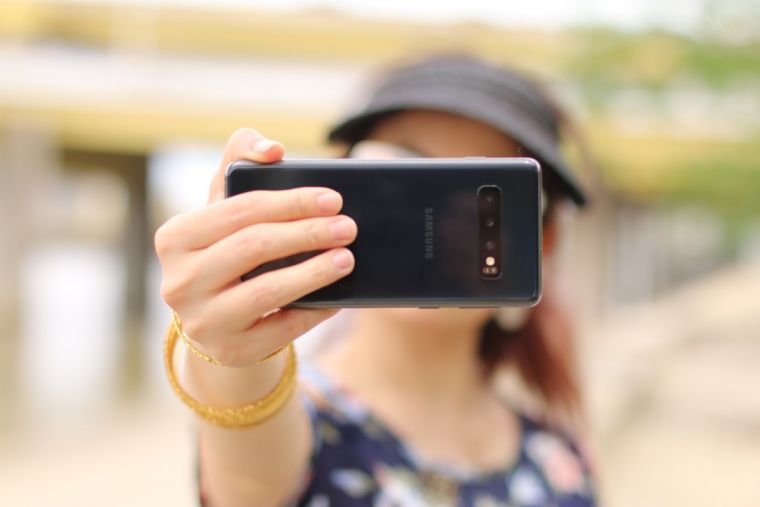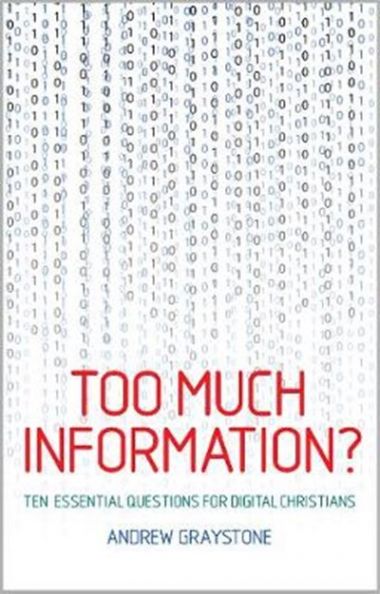Can the Church give a meaningful answer to the spiritual questions of the digital age?

From social media, apps and online services, to robots, virtual home assistants and artificial intelligence, the digital era is rapidly changing the way we live - and even worship.
But what is it doing to us as people? And what is the church saying about it - if anything?
These are questions that Andrew Graystone seeks to answer in his new book, Too Much Information, from Canterbury Press.
He admits he hasn't got all the answers, but with the line between humans and technology becoming increasingly blurred, he wants the Church to be having its own discussion about what this new world means both in terms of human flourishing and our relationship with God.
He speaks to Christian Today about the conversation he wants to see taking place in the Church.
CT: The title of your book is very relevant because we are living in an age of information overload. What do you think that's doing to us as people?
Andrew: I think that's exactly the right question because what many of us are trying to do is to cope with the technology being thrown at us, like voice recognition, which phone to buy, what age we should give our kids a phone etc.
But while we're worrying about the technology, we're missing out on some of the big questions around our values in the world around us and what kind of world we're creating.
I'm not the person to talk to about technology or which phone to buy but I am keen that we talk not so much about what the technology can do for us but what the culture surrounding it is doing to us.
CT: You write in your book that the church hasn't really been at the forefront of this conversation and instead, some churches are still trying to work out how to even set up their own Facebook page!
Andrew: I think people who are a bit older like me quite often get stuck on those technological questions. Of course, if you want to set up a Facebook page or church website, or podcast your sermons, that's easy. All you have to do is ask a teenager to do that for you!
But our responsibility as slightly older Christians is to help that teenager ask questions about the world in which they are growing up knowing how to do all these things.
The key thing that I am anxious about in that respect is the dehumanising effect of digital culture.
CT: There is quite a difference between how older people are experiencing the digital era and how young people are. It's very different for the kids growing up with YouTube and Facebook. Do you think the church is speaking effectively into the challenges these are throwing up?
Andrew: I often hear church leaders talking about the surface issues like how long we should spend in front of a screen or what sort of content is ok to access on the internet. Obviously these are important things, but I think there are even more important considerations like what effect it has on us to project our personality in a disembodied way.
What effect is it having on us that people we used to deal with in person are now computers? For example, if you go to the bank for a loan or mortgage, in my grandfather's day you had to go into the bank and sit down with the manager and he would have to decide whether he thought you were worthy of having a mortgage or not. Now my bank doesn't even have any branches or managers and it's just a big computer in Leeds. They don't even know my name. It's just a set of numbers. My bank doesn't know anything about my particular needs, my health, any of those other things that are much more human.
The risk in this is that when we deal with each other only through computers we start to value just the things that can be counted. A lot of us will wear devices like Fitbits that will count how many steps you've taken today, what your heart rate is, or what your blood pressure is but there are some things you can't count with a Fitbit.
You can't count how kind someone has been today or how sad they've been. And the trouble is that the things that make us most human are impossible to count. But we end up giving higher value to the things we're able to count so that the things we're not able to count we think, well, they can't be very important because they're not 'quantifiable', as a computer scientist would say.
These are the sorts of things I think Christians need to be worried about; the increasing value on the quantifiable as opposed to the unquantifiable, because our humanity is mostly made up of the unquantifiable things.
CT: That plays into the whole debate about robots and artificial intelligence, and at the end of your book, you imagine a future in which there will be different 'types' of humans because the line between the robot and the human is going to become increasingly blurred.
Andrew: Yes, my worry is that we will take this reality for granted. If you add a piece of technology to a human being, what you've got is a human being plus a piece of technology, not a new kind of human being. But we quickly assume that what we've done is created something that is amazing.
We have to remember that the things we create are always less than ourselves. If we find ourselves creating or making things that we count as more valuable than ourselves, that's idolatry. An example of that would be Alexa and other machines that answer questions for you. You can ask Alexa what the weather is or what the traffic is like but you can't ask Alexa what love feels like or to pray for you.
We can give computers names, like Alexa, and give them genders and treat them as if they were people. And we can think that computers are deciding things or learning things, but the computer can't decide or learn or do or even compute by itself, because all of these things come from humans.
If we start treating computers like humans, we can only do that by making ourselves smaller. That's why one of my chapters is called 'Are computers getting smarter or are we getting more stupid?'

CT: You went to a love convention called the International Congress on Love and Sex with Robots. Do you think that the technology is advancing before we've had time to think through the moral dimensions of what we're doing?
Andrew: At one level that is true, but on another it's not actually. We're just telling ourselves the story that the technology is advancing at a fantastic rate. Love and Sex with Robots is a great example of that because the newspapers and TV news channels are full of stories about sex robots and how they're taking over the world. But it's not true; they don't actually exist. They make for a good headline or documentary but they don't exist and almost certainly won't exist, and the bit of academic research that's been done suggests that even if they did exist, nobody would really want to use them because they're just pretty unattractive. They can't replace a real human.
What is very close to happening, though, is virtual reality being added to online pornography so that you can have a kind of immersive online experience. The trouble is that all the time we are lowering our standards and expectations, and we may end up in a state where people know it's not as good as having a relationship with a real human being but they're prepared to say that it's good enough, and they'll argue that it's got it's advantages: you can't catch anything nasty from a computer; you can't get pregnant from a computer etc. And so we'll say it's good enough and we'll settle for it. What Christians will want to be saying is, well,l no, there's more to be had than that.
CT: It almost sounds like with all these rapid changes, it's actually something the Church can really speak into and the Bible actually has so much to say about this at a time when people will really need to hear it.
Andrew: Yes, the core fact of the Christian faith is about God becoming human. And so we've got such important things to say about the importance of humans and the way God has made humans sacred, and made bodies valuable and precious and sacred, and that we shouldn't devalue them.
And yet I'm slightly frustrated that instead of talking about that, we're talking about how to set up a Facebook page. That's why I wrote the book!
CT: In the book, you admit that you haven't got all the answers.
Andrew: Yes, perhaps we're not at the answers stage yet.
CT: There really is that sense, though, that history is being made in the time that we're living in.
Andrew: I guess everybody thinks that they live at a pivotal age in history but this really does feel quite like that - the first digital age or internet age or whatever we're going to call it looking back.
In one sense, it's not that everything's changed. In one sense, nothing's new. No new sins have been invented for the digital age; it's all just the old ones coming back in different forms. But we need to get good at recognising that.
CT: You write that the internet can make virtual liars out of all of us and how we can create a different persona online from who we are in real life.

Andrew: Look at the way that teenagers work at perfecting their social media profiles. I've got a friend who publishes photos of herself nearly every day but always using a filter of one sort or another that maybe takes out what she thinks of as imperfections. But actually, it's the imperfections that make us who we are.
We had a set of family photos taken in a studio and the photographer had removed the mole off my chin! That's been with me all my life, that's part of me. That's actually me! But the picture wasn't quite telling the truth about me. The photographer obviously thought he was doing me a favour!
We do that to each other and to ourselves. We try to create a slightly improved version of ourselves which in some ways is fakery. If we are creating fake pictures of news events or manipulating the truth in a really serious way, then we need to be worried. Christians are people who need to be committed to the truth as it actually is and not the 'tidied up' truth.
CT: We're so connected through things like Instagram and Facebook, and yet some experts warn that Instagram and Facebook just play into depression because we tend to compare our own lives to others'.
Andrew: I suppose we used to compare ourselves to the handful of people we used to know who lived near us, or who we went to school or work with. Now we can compare ourselves with people we're never going to meet and we are perhaps idealising their lives.
But I don't want to sound completely down on all of this because I'm not. It's an age of great opportunity and particularly for Christians. When I was younger I can remember Christians putting up radio masts in the Seychelles to broadcast radio programmes into parts of the world that wouldn't otherwise hear the Gospel. Now you don't need to do that and you can broadcast anywhere you like, you can broadcast from your own bedroom.
There are great advantages to that and I think St Paul would have loved to be alive today. He would have been podcasting his sermons and we might have had St Paul's 345th email to the Corinthians! Social media is a great communication tool, we just need to do some careful thinking about how we use it.











